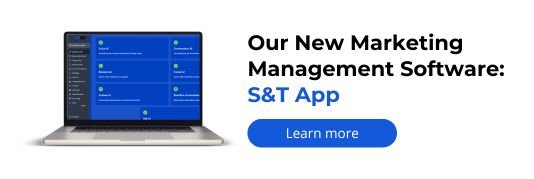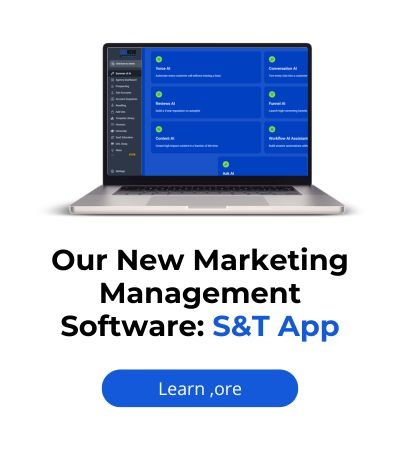In the fast-paced world of B2B or business-to-business digital marketing, staying ahead of the competition is crucial for marketers looking to make their mark online.
Marketing automation has emerged as a game-changing technology, revolutionizing the way marketers strategize, execute, and measure their efforts.
You can experience a 451% increase in qualified leads if you use B2B marketing automation software. Cool, right? In this blog, we will explore how marketing automation is transforming both digital and content marketing, driving better results and improving overall efficiency for B2B companies.
Marketing Automation in B2B Digital Marketing
Recent studies show that marketing automation often results in an improvement in sales productivity of up to 14.5% and a decrease in marketing overhead of 12.2%.
When adopting marketing automation software, 80% of users noticed an increase in leads, and 77% experienced an increase in conversions.
So how does B2B marketing automation work? Below are some points that will help you understand marketing automation a little better.
Personalized Customer Journey
Marketing automation allows businesses to create personalized customer journeys by tracking and analyzing customer interaction across various touchpoints.
Let’s say you visited a website or opened an email.
By doing this, marketing automation tools will gather data and build customer profiles from that data.
This enables you as a marketer to deliver targeted and relevant content, improving overall efficacy by using marketing automation tools.
With B2B marketing automation, you can set up triggers that activate specific actions based on the behavior, for example, generated messages for e-commerce shopping websites, where a customer adds an item to the cart but doesn’t go through the payment process.
In this condition, the company can send a message or an email, saying to complete the process using a marketing automation tool. This will encourage your prospect and enhance their experience.

Lead Generation and Nurturing
With the help of marketing automation, automated lead generation and nurturing workflow will help you identify potential customers, engage with them, and nurture them through the sales funnel.
With marketing automation, leads are scored based on their behavior and interaction, allowing you as a marketer to focus on high-quality prospects and provide them with tailored content at the right time.
Lead nurturing through marketing automation involves sending automated emails to leads based on their stages in the buyer’s journey.
You must have received welcome emails from companies after you signed up for their newsletters.
That welcome email is a classic example of nurturing. With the help of marketing automation, companies often send emails to make customers more connected to the brand. The company will continue to send emails to make you familiarize with the company; and with time, emails can be about case studies and published papers or product demos to guide you to purchase the product. This all will become extremely simple if you are using a B2B marketing automation tool.
Marketing Automation in Content Marketing: Content Personalization
Content marketing thrives on providing valuable and relevant content to audiences. Marketing automation lets businesses personalize content based on user behavior, interests, and preferences.
Personalization in content marketing goes beyond just addressing customers by their names. It involves tailoring the content itself to match individual preferences. For example, a travel agency website can use marketing automation to show personalized destinations to customers based on their past travel history. This will make the customer experience better.
Content Distribution and Promotion
Marketing automation simplifies the process of content distribution and promotion. Automation tools can schedule and publish content across various channels, including social media, email newsletters, and websites.
This ensures that the right content reaches the right audience at the most opportune moments, maximizing its impact and reach.
Fact: 19% of content marketing teams use marketing automation platforms (Semrush, 2022). Amazing how marketing automation is helping businesses and showing effective results.
What are B2B Marketing Automation Tools?

There are plenty of marketing automation technologies available to automate your routine marketing tasks. Let’s explore the most used B2B marketing automation software in 2023!
Some of these platforms only offer email activities, drip sequences, and CRM updates. Others may offer assistance with SMS, lead rotation, lead scoring, and other tasks.
By improving productivity overall and giving you more time to work on important projects, marketing automation literally makes your job easier. For instance, you can utilize marketing automation solutions to gather important information that will help you make personalized marketing campaigns and boost conversion rates.
Let’s explore the top 5 marketing automation tools in 2023.
1. HubSpot: The All-in-One Marketing Automation Solution

HubSpot is a comprehensive inbound marketing and sales platform that offers a suite of automation tools for digital marketing and content marketing.
With HubSpot, businesses can streamline lead generation, nurturing, and customer engagement across various channels.
For digital marketing, HubSpot’s automation features include personalized email marketing campaigns, social media scheduling, and website analytics. Marketers can create automated workflows based on customer behavior and segment leads for more targeted campaigns. HubSpot’s content management system (CMS) facilitates seamless content creation, optimization, and distribution.
2. ActiveCampaign: Empowering Personalized Customer Journeys

ActiveCampaign is renowned for its focus on customer experience and personalization. This marketing automation tool empowers businesses to create highly tailored customer journeys based on customer behavior and preferences.
For content marketing, ActiveCampaign offers automation for email campaigns, helping marketers deliver relevant content to segmented audiences. This tool integrates with website tracking and event tracking, enabling marketers to understand customer engagement and respond with targeted content.
3. Marketo: Scalable Automation for Enterprise-Level Marketing

Marketo, now a part of Adobe Experience Cloud, is a robust marketing automation platform designed for large enterprises. It offers a range of advanced features that cater to complex marketing workflows and high-volume campaigns.
For content marketing, Marketo’s automation capabilities allow marketers to personalize content and tailor it to different buyer personas. With Marketo’s lead scoring and nurturing features, marketers can deliver the right content to the right audience at every stage of the buyer’s journey.
4. MailChimp: Simplified Email Automation for All Businesses

MailChimp is a user-friendly marketing automation tool, primarily known for its email marketing capabilities. It is an excellent choice for businesses of all sizes, offering automation features that make it easy to engage with customers and prospects through email campaigns.
For content marketing, MailChimp enables marketers to create automated email sequences, delivering relevant content to subscribers and leads based on their behavior. It integrates seamlessly with various content management systems and e-commerce platforms, simplifying content distribution.
5. Keap: Nurturing Leads and Growing Relationships

Keap (formerly known as Infusionsoft) is a marketing automation and customer relationship management (CRM) tool built for small businesses and solopreneurs. It offers automation features to nurture leads, manage sales, and maintain customer relationships.
For content marketing, Keap’s automation allows businesses to deliver personalized content to leads, encouraging them to engage with the brand.
It facilitates automated follow-up emails, ensuring leads stay informed and connected throughout their buyer’s journey.
Conclusion
Marketing automation has become an indispensable asset for businesses aiming to thrive in the digital marketing and content marketing landscape. Each of the top 5 B2B marketing automation tools – HubSpot, ActiveCampaign, Marketo, MailChimp, and Keap – brings unique strengths to the table, catering to various business needs and sizes.
- HubSpot stands out as an all-in-one marketing automation solution, streamlining lead generation and content management.
- ActiveCampaign empowers personalized customer journeys and exceptional content experiences.
- Marketo offers scalable automation for large enterprises, allowing for sophisticated marketing workflows.
- MailChimp excels in simplified email automation, making it accessible to businesses of all sizes.
- Keap helps small businesses nurture leads and grow relationships through tailored content.
By incorporating these marketing automation tools into your strategies, your business can optimize its digital marketing efforts, engage customers on a personal level, and achieve remarkable results.
Embracing these powerful tools is no longer an option but a necessity for businesses looking to succeed and stay ahead in the dynamic world of digital and content marketing.
Do give these tools a try, if you haven’t already and let us know your experience in the comments below!
Written by Kshitija Sakhalkar from Socinova. Images have their copyrights from respective sources.








